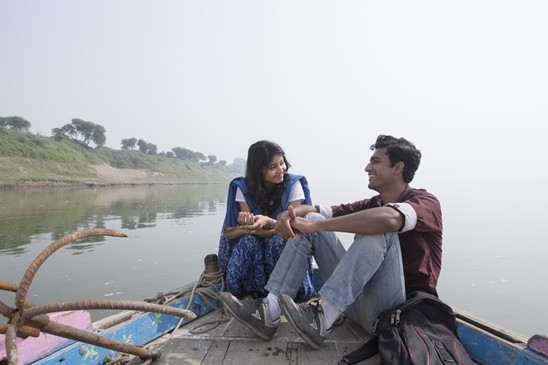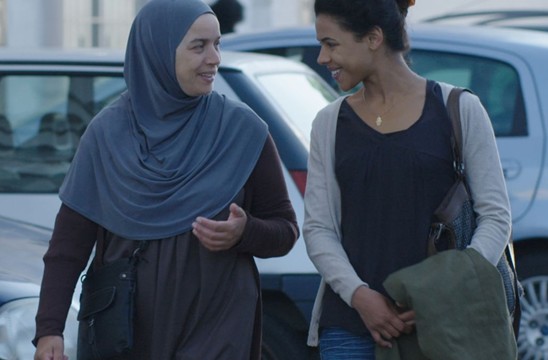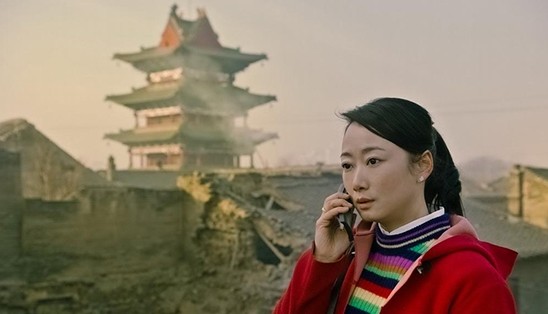
I’ve only been to Cannes once before, three years ago and find it much calmer this time around. Maybe I’ve aged but its intensity and various absurdities – the noise, the insanely bad red carpet music, the constant stream of people in full evening wear hustling for tickets outside the Palais, even the quixotic plastic surgery – seem more charming. Less appealing is the sexism: I’m on the bus from the airport when I read Catharine’s tweets about being rebuked for wearing flats to screenings; at the apartment Hatice and I decide I should probably err on the side of smarter rather than not for a red carpet screening of Denis Villeneuve’s (Incendies, Enemy) Sicario, so I put on a dress and heels, only to get a text from Jonny as I’m halfway along the Croisette saying “Wear what you like! It’s fine!” and regret not wearing the Birkenstocks in my suitcase.

Sicario is a great start to the festival: an immensely confident film, dark tonally and thematically, with Emily Blunt as an FBI agent working around the US / Mexico border who makes an unpleasant discovery and is called on by Josh Brolin and Benicio del Toro’s team to help investigate the powerful cartels channelling drugs into the States. Blunt is very good, both believable and sympathetic as tough but vulnerable, quintessentially American agent Kate Macer. Pulled out of procedural ops into the ambiguous workings of the drugs war on a grand scale, surrounded by people whose propensity for staggering violence and amorality is deeply troubling to her, embodying a kind of cultural American naivety, she gradually attains an understanding of her superiors’ worrying motivations. Sicario is beautifully shot by Roger Deakins, with bleak desert landscapes, city scapes of Ciudad Juarez and militaristic overhead sequences using infra red cameras that make the surface of the earth look alien and implausible, increasing our sense of Kate’s estrangement. And the score is great; propulsive and malevolent, it adds further unease to this Michael Mann-esque thriller.
Afterwards Jonny and Hatice go to The Chosen Ones while I get my bearings, run errands and meet up with everyone for supper, before going to the Lorton party for drinks and yacht-gazing.

On Wednesday I meet Jemma for a Critics’ Week screening of Krisha, Grand Jury winner at SXSW. It’s a directorial debut in which the titular character, a sixty-something troublemaker, turns up to a family reunion hoping to make amends for past misdeeds. It’s energetic and has some interesting stylistic ideas, but feels uneven and not especially convincing.
Hatice and I then go to watch Taklub in the Salle du Bazin. The latest film from Brillante Mendoza (Kinatay, Captive) it’s a study of survivors living in a region hard hit by typhoon Haiyan; all of whom are suffering from post-traumatic stress and are steeped in griefs both personal and societal. Still living in tent-like houses, they are waiting to be relocated and in the meantime are stuck at the site of their losses, mirroring their psychological stasis. Mendoza’s film is eloquent on the impact of large-scale grief and the echoes of unimaginable trauma but also offers hope, not least by affording his well-acted characters considerable dignity.

Afterwards we get straight back in the queue for Masaan, a drama set in Benares in India along the Ganges. The river is a constant feature in this film, which follows two young characters as they experience first love and sudden, tragic twists of fate. Piquant and engaging, it’s consistently entertaining and drawn with a light, deft touch.

Then we’ve time for a crepe and some mistaken celebrity sightings (I’m sure it was Vin Diesel I saw on that bench) before what turns out to be my favourite film of the day: Philippe Faucon’s (Dans la vie) Fatima, a study of a French Algerian woman and her two daughters, ambitious medical student Nesrine and disaffected teen Souad. Fatima, divorced from her daughters’ father, cleans for a living and is a supportive and loving, if occasionally hectoring, figure to her kids. Conflict arises from the differences between her views and their nascent independence, struggles for identity and ambitions (or in Souad’s case, lack thereof). Fatima is aware of the loneliness of her position – wanting to push her daughters on and into a world that is largely inaccessible to her, as she doesn’t speak French fluently and sits outside a society her daughters are more privy to.
So it’s a familiar story of culture clashes and the differences between first and second-generation immigrant experiences, but the subtlety and individuality of the characters, allowed complexity and to persistently defy narrative expectations, as well as the glimpses of Fatima’s inner life and poetic soul (she writes down her thoughts in Arabic at night) enable it to transcend this, and it ends on a note that is hopeful and touching whilst evidencing all the other emotions running through the narrative. At the end the cast and Faucon receive a standing ovation and Hatice and I leave on a high, creep up on Jonny at the Cinema de la Plage, scare him and go for dinner.

The next morning Jonny and I try to see Youth, the new Paolo Sorrentino (The Great Beauty, The Consequences of Love). But the queue isn’t on our side – at one point a surge of people overtakes us without comment, and we stare at each other with a peculiarly British horror – and we don’t get in. We go for a Nespresso instead, then I come back for Mountains May Depart, the new Jia Zhang-ke (Still Life, 24 City, A Touch of Sin).
Typically ambitious, it offers a treatise on the perils of ‘going west’ (the Pet Shop Boys’ track opens and closes the film) and the losses – both for its individual citizens and as a country, and both contemporary and potential – for China in blindly following capitalism. Zhao Tao, Zhang-ke’s wife and frequent collaborator stars as Tao, who must choose between two suitors, coal miner Liang and entrepreneur Jingsheng, and two paths. Marrying Jingsheng, they have a son (the horribly named ‘Dollar’) who takes up the story in the film’s melancholic, futuristic final act, set in Australia where Dollar lives with his father, estranged from his mother, China and any real sense of identity. This part of the film is flawed, but still absorbing and both physically and intellectually expansive; Zhang-ke exploring ideas of cultural and emotional alienation that feel key to his always rich, always compelling depiction of modern China.

